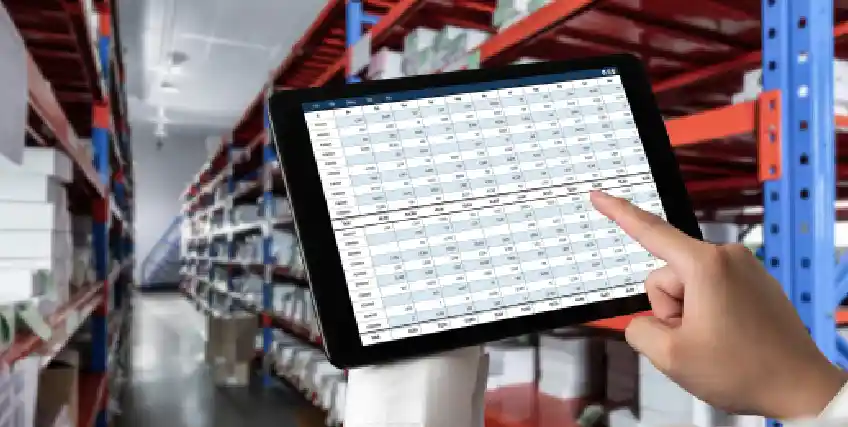Financing Warehouses: How E-commerce Businesses Use Commercial Real Estate Loans to Scale Fulfillment
August 06, 2025 | Last Updated on: August 06, 2025

The buying behavior of a customer has transformed drastically in the last few decades. The main reason for this change can be attributed to the rise of ecommerce companies. The growth of the ecommerce industry has not only changed everything about how customers buy but also how business owners store, pack, and ship what they sell. E-commerce companies now rely on fulfillment centers and third-party logistics (3PLs) to ensure that products can be delivered on time without any damage. They are fast and scalable, particularly beneficial to small businesses that have no assets of their own. But as your order volume explodes, so do your headaches.
Dealing with limited space, missed handoffs, and rising storage fees can have an adverse effect on finances and customer trust. And that’s the moment when a lot of e-commerce brands make decisions to start owning their own warehouses.
Instead of pouring thousands of dollars into monthly lease payments or fighting for storage slots, e-commerce sellers are buying or building warehouse facilities tailored to their fulfillment needs. This way they get more space, faster delivery, and better margins. But there’s a catch: warehouses aren’t cheap too.
That’s where commercial real estate loans come in. These financing tools help small business owners buy, revamp, or even build warehouse spaces without draining working capital. With the right terms, your monthly loan payment might actually cost less than your current 3PL contract.
If you’re shipping 1,000+ orders a month and your fulfillment setup is starting to crumble under pressure, it might be time to explore commercial real estate loan options. Because renting space forever is not the only way to scale.
Warehouse Real Estate: Should You Rent It or Own It?
Renting warehouse space may seem flexible and low-risk but in a fast-scaling business, flexibility can get expensive. Here’s why commercial real estate loans are flipping the script for e-commerce growth.
1. Ownership = Control Over Fulfillment
When you own your warehouse, you control everything from racking layout to automation tools and shipping docks. That level of flexibility is tough to achieve in a leased facility. More control means you can optimize packaging lines, staff shifts, and delivery schedules around your needs and not the landlord’s rules. A commercial building loan gives you the upfront capital to design your space the way your business demands.
2. Rising Lease Rates Could Cripple Margins
Industrial lease rates are up across the board. According to JLL, warehouse rents have jumped over 30% in some logistics hubs. That can eat into your margins fast. But with fixed rate commercial real estate loans, your monthly payments stay predictable. Plus, you're building equity, not just handing cash to a landlord every month.
3. Warehouses Can Appreciate in Value
Warehouse properties in high-demand areas, like near ports, highways, or fulfillment centers, have seen steady appreciation. That means your commercial property becomes an appreciating asset, not just a storage solution. With a proper loan-to-value ratio, your equity can grow as your business scales.
How Commercial Real Estate Loans Work for Warehouses
Commercial real estate loans are designed to help small businesses like yours acquire, build, or refinance property. But before you apply, it’s crucial to understand how these loans actually work.
1. Loan-to-Value Ratio: How Much You Can Borrow
Most commercial real estate loans cover 70%–80% of the property’s value. You’ll need to make up the rest with a down payment. Your loan-to-value ratio determines the risk for the lender. The lower your LTV is, the better terms you can usually get. Keep in mind: higher LTV may trigger stricter underwriting or require additional collateral.
2. Terms, Rates, and Amortization
CRE loans typically span 5 to 20 years with amortization schedules that match your long-term business plan. You can choose a fixed rate to lock in predictable monthly payments or a variable one to start lower. Some loans have balloon payments at the end. Always read the fine print on repayment terms and prepayment penalties.
3. Property Type & Use: What Qualifies
Most lenders approve commercial real estate loans for owner-occupied warehouses used for storage, shipping, or fulfillment. Your facility must be used primarily for business and not investment. Mixed-use or multifamily properties may fall under different rules. Knowing your property type upfront helps speed up your loan application process.
4. Working with the Right Lender
Not all commercial lending institutions are built the same. Some are FDIC-insured banks, others are credit unions or non-bank financing companies. You’ll want one familiar with e-commerce and logistics. Look for lenders who understand seasonality, inventory cycles, and cash flow volatility as they’re more likely to offer flexible loan options.
What Lenders Look for in Warehouse Loan Applications
Securing commercial real estate loans isn't just about applying. Lenders evaluate every angle of your business to reduce their risk. Here's what they'll scrutinize before offering a warehouse loan program.
1. Cash Flow & Revenue Trends
You need to show you can cover the loan’s monthly payments, even during off-seasons. Lenders want to see 12–24 months of financials showing strong cash flow and stable sales. High expenses or inconsistent revenue? That’s a red flag. Reliable earnings help unlock better credit approval odds.
2. Creditworthiness: Yours & Your Business’s
A good credit score proves you're a reliable borrower. Most lenders expect a personal FICO of 660+ and strong business credit. Missed payments or maxed-out credit cards may stall your loan application. Clean records help you negotiate lower interest rates and avoid strict collateral demands.
3. Down Payment Strength
You’ll typically need to put 10%–25% down payment for a commercial real estate loan. A larger down payment signals confidence and lowers risk for the equal housing lender. Not enough liquid capital? Consider an SBA 504 loan. They often require just 10% down payment.
4. Warehouse Location & Condition
Where your commercial property sits matters. Proximity to highways, ports, and fulfillment hubs improves your odds. Lenders also review appraisal reports, such as “is the building modern or does it need repairs?” The better the condition, the smoother the underwriting process.
5. Business Plan & Purpose of Use
Don’t just say you want a warehouse. Show how it’ll grow your operations. A sharp business plan explains what you'll do with the property, your revenue targets, and operational improvements. That context builds lender confidence and pushes your credit approval forward.
Pros and Cons of Using Commercial Real Estate Loans for Warehouses
Commercial real estate loans offer big advantages, but they come with a few trade-offs. We’ve broken it down to help you decide.
Pros of Using CRE Loans
1. Build Equity While You Grow
Every monthly payment builds ownership. Unlike leasing, your money doesn’t vanish — it turns into real estate value. With a commercial real estate loan, you gain a physical asset that appreciates over time. That’s a long-term advantage that boosts your business banking profile and borrowing power later on.
2. Lock in Predictable Monthly Costs
With a fixed rate structure, you avoid rising lease expenses. That predictability helps manage your working capital and plan around your sales cycles. Over time, owning your facility through a mortgage loan can cost less than renting, especially if rents rise in your area.
3. Tax Perks Can Lower Your Net Cost
Tax advantages aren’t just fluff. Interest, property taxes, depreciation – they may be all deductible. Your commercial real estate loan becomes a tool for reducing taxable income. It’s a financial edge, especially when compared to leases, which offer fewer deductions. However, it is advised to consult a tax professional.
Cons of Using CRE Loans
1. High Upfront Costs
Let’s face it - down payments, closing costs, appraisals, and underwriting fees tend to add up fast. Depending on the loan amount, you may need substantial capital in hand. For newer e-commerce businesses, that cash could be tough to free up without hurting operations.
2. Long-Term Financial Commitment
You’re tying your business to a commercial property for potentially 15–20 years. What if your sales drop? Or you outgrow the space again? A short-term lease gives you more flexibility, whereas a commercial real estate loan anchors you long-term. Not always a bad thing but definitely a factor to weigh.
3. Risk of Prepayment Penalties
Trying to refinance early or sell the property? Some CRE loan programs hit you with prepayment penalties. It’s something many business owners miss in the fine print. These charges can wipe out any savings you hoped to gain from refinancing or early repayment.
You may also like: Small Business Funding Options for Online Store Owners
Conclusion
E-commerce businesses aren’t just selling faster — they’re shipping faster, too. And as order volume grows, relying on third-party logistics can start feeling like juggling blindfolded. That’s when owning a warehouse goes from “someday” to “now.”
For many online sellers, commercial real estate loans are the bridge between chaotic fulfillment and stable operations. Instead of leasing yet another warehouse from a middleman, they choose to control their space, build equity, and lock in predictable costs.
Sure, it’s a big step. You’ll need solid cash flow, a sharp business plan, and probably a chunk of cash for the down payment. But when the math works, it really works. Your loan becomes a business-building tool, not just a bill.
And as rents continue to rise, locking in ownership can protect your margins. Especially with flexible loan options, like SBA 504 loans or long-term fixed rate products. Warehouse ownership doesn’t just scale fulfillment; it can stabilize your entire business model.
So, it’s true that owning isn’t for everyone. But if your fulfillment volume is growing, and your 3PL costs are climbing, it might be time to run the numbers and explore business real estate loans.
FAQs About E-commerce Businesses Using Commercial Real Estate Loans
1. What are commercial real estate loans?
Commercial real estate loans are used by small business owners to buy or build properties like warehouses or retail buildings. These aren’t quick-fix loans. They’re structured, often long-term, and can include fixed rate or variable terms. Great for owners wanting equity instead of just renting space.
2. Can an e-commerce company qualify for a commercial real estate loan?
As long as you show strong cash flow, stable revenue, and a clear fulfillment need, your online-only model won't disqualify you. Just be ready with a solid business plan and loan application. And yeah, your credit score matters too.
3. Do I need to occupy the warehouse, or can I rent it out?
Most CRE loan terms require the property to be owner-occupied. That means you can rent out part of it, but not all. If you're looking to invest in a full commercial property for rental income, you'll need a different loan type.
4. What happens if I want to refinance later?
You can totally refinance your existing commercial real estate loan, especially if your credit improves or interest rates drop. Just keep in mind: some loan programs come with prepayment penalties. So you’ll want to check the terms first.
5. What kind of lender should I go with?
That depends on your goals. Some go with FDIC-insured banks, others use credit unions or business loan companies. Choose one that understands your industry.
Frequent searches leading to this page
Term Loans are made by Itria Ventures LLC or Cross River Bank, Member FDIC. This is not a deposit product. California residents: Itria Ventures LLC is licensed by the Department of Financial Protection and Innovation. Loans are made or arranged pursuant to California Financing Law License # 60DBO-35839




